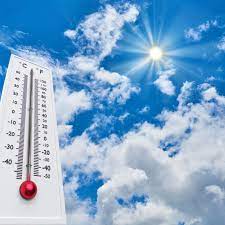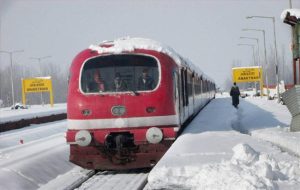
Climate change to bring more extreme weather events to Kashmir, including September heatwaves
By: Wahid Bhat
Kashmir is currently experiencing an unprecedented heatwave in September, shattering long-standing temperature records due to an ongoing dry spell that has persisted for the last 45 days. Srinagar, on September 12th, recorded a scorching maximum temperature of 34.2°C, a staggering 6.0°C above the normal seasonal average.
This marks the second-highest maximum temperature ever recorded in September since the establishment of the weather observatory in 1891. The previous record of 33.8°C dated back to September 1, 1970, with an all-time high of 35.0°C set on September 18, 1934.
Qazigund has also witnessed record-breaking temperatures, with a maximum of 33.2°C, a deviation of 6.7°C from the norm. This new all-time record surpasses the previous record of 32.8°C from September 12, 2019, and stands as the highest since the observatory’s inception in 1956.
A sweltering temperature of 32.0°C was recorded in Kokernag, establishing an all-time record, the highest since 1977 when the observatory was established. This substantial departure from the normal temperature was 6.6°C above average. Furthermore, the previous record of 31.8°C was also set earlier this month on September 2.
Experts have warned that such extreme events are becoming more common due to climate change and that it will only worsen as temperatures continue to rise.
Dr. Rajesh Verma, a climate scientist at the National Institute of Climate Studies, “The heatwave in September is a clear indication of the changing climate patterns. Kashmir is not immune to the global phenomenon of rising temperatures due to climate change.”
Dr. Verma further added, that human activities, including deforestation and the release of greenhouse gases, are contributing to this change. He added, “The Himalayan region, including Kashmir, is particularly vulnerable to these changes, and it’s imperative that we take swift measures to mitigate the impact.”
Kashmir heatwave brings hardship
The heatwave is causing widespread hardship and disruption in Kashmir. Locals are struggling to cope with the intense heat, and many are finding it difficult to work or go about their daily lives. Tourists are also being affected, with many cancelling their trips to the region.
Sonam Lotus, Director of Met Centre Srinagar, said, ‘While June and July had recorded good rains, August-September has been much hotter, resulting in a rainfall deficit.’”
The weather officials have cited the prime cause for the heatwave as prolonged dry spells and less moisture. However, Lotus has also underlined other causes of sweltering temperatures besides climate change. He said, “Factors such as urbanization or construction activities also play a part; however, they have a minimal impact. They don’t affect the temperature changes significantly and have gradual consequences.”
The Outlook Traveller reports that experts believe that factors such as deforestation, urbanisation, and climate change are contributing to this historic heatwave in Kashmir. This heatwave is due to climate change and its impact on weather patterns in the region.
According to PreventionWeb, the ongoing heatwave in Kashmir spells a difficult future for pastoralists in the region. The lack of rainfall and snowfall in recent months has led to a water crisis, affecting agriculture and pastoralism.
Locals and tourists alike are struggling with this unprecedented heatwave in Kashmir. Manzoor Ahmad from Srinagar said “It was the first time that he experienced such hot weather. The hot weather is causing problems for the people, he said, lamenting the shortage of drinking water supply points in the city”.
Locals and tourists disappointed by heat
Sneha Mandal from Kolkata said, “We thought the weather would be like in winter but it was nothing like that. The temperature has affected our health as well”.
“This is the worst heatwave I have ever experienced in Kashmir in September,” said Mohammad Ali, a shopkeeper in Srinagar. “The heat is unbearable, and it is making it very difficult to work.”
He added, “The heat is unbearable. It’s like we’ve skipped autumn and gone straight into summer. Our power bills have skyrocketed because of increased use of fans and air conditioning.” Our animals are suffering. The grazing lands parch, and the water sources dry up faster than ever before. We need immediate support to ensure our animals’ survival.”
Ghulam Rasool, a shepherd in Kokernag, stated, “The heat is causing difficulty for my livestock to graze, and I am concerned that they will not be able to survive.”

